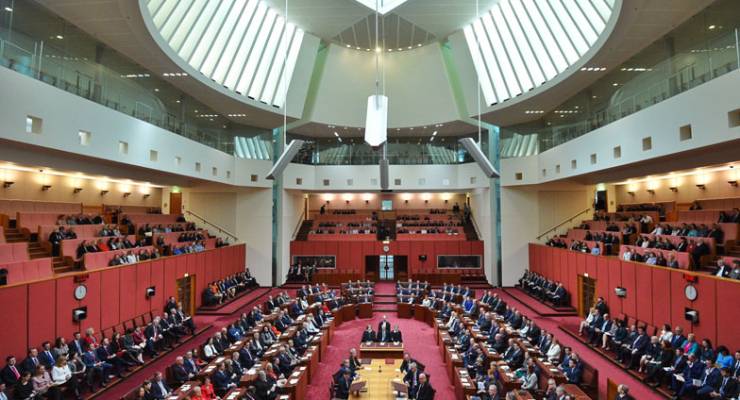
“Let us continue the 45th Parliament in the way we begin it today, with mutual respect, goodwill and a shared commitment to advance Australia and all Australians,” Prime Minister Malcolm Turnbull said at the Welcome to Country ceremony in the Great Hall in Parliament House yesterday.
But the Welcome to Country and smoking ceremony is a rare moment of bipartisanship for Parliament. It is one of the first times all the new MPs and senators are gathered together in the one place before the much more rigid and pomp-filled Westminster ceremonies commenced. While Bill Shorten and Turnbull were sat on the stage, MPs milled about waiting for the proceedings to commence. Bob Katter brought his grandchildren, and Tony Abbott was spotted getting photos with school kids and the indigenous students who were dancing in the ceremony.
The leaders, as well as Indigenous Affairs Minister Nigel Scullion, had their faces painted during the ceremony. Scullion and indigenous Labor MP Linda Burney were seen still sporting the face paint later in Parliament, but Turnbull, Shorten and Nationals Leader Barnaby Joyce had taken time to clean up.
Outside, a welcome of a different kind was going on, as protesters welcomed “bigoted” politicians to the new Parliament.
[Some people just can’t reach: give up on Pauline and her ilk]
Next came the swearing-in of the MPs and senators. Senator Pauline Hanson, Senator Derryn Hinch, Senator Malcolm Roberts. Now it’s official. The new seating arrangements put Hanson and her three senators on the government side of the chamber, with Hanson up the front on her own (yesterday seen sporting a zebra-striped jacket, a standout among an array of black and blue suits).
When Scullion was sworn in, Labor’s Stephen Conroy heckled that Scullion’s next Senate term might be the shortest ever.
“Adam Giles is coming!”
Hanson was the most popular member of the new Senate yesterday. When all MPs and senators gathered in the Senate, Katter, Peter Dutton and Cory Bernardi among others all bailed up the One Nation leader.
The goodwill and mutual respect Turnbull spoke of came to an end as Bernardi — fresh from his discussions with Hanson — revealed he had the signatures of almost everyone of the Coalition Senate backbench, plus Hanson’s crew and Hinch, Bob Day and David Leyonhjelm, for the conservatives’ favourite issue: repealing 18C.
While Bernardi was trying to wedge Turnbull on the right, the progressives’ favourite issue, same-sex marriage, hit him from the other side. Bill Shorten and Tanya Plibersek announced plans for yet another private members’ bill on marriage equality, to pre-empt a crossbench bill also announced by Greens MP Adam Bandt and independent MPs Cathy McGowan and Andrew Wilkie.
Governor-General Peter Cosgrove’s speech to Parliament is supposed to be the focus of the first day, setting out the government agenda, but it was a distraction from the distractions. The biggest reaction came when Cosgrove turned to the NBN, detailing how many homes could connect to the NBN. There were murmurs from Labor’s side about how the government has stuffed it up, and everyone watched Conroy.
Perhaps the biggest endorsement of the speech came from Hinch, who fell asleep. He’s assured us he’s taking his No-Doz for today. Want the Senator’s own account of proceedings? Look out for Hinch’s Senate Diary in Crikey tomorrow.
[Hinch’s Senate Diary: first day of school]
It was Conroy who ended the day in the Senate once all the ceremonies were over, when debate turned to another ancient tradition: parliamentary privilege. Conroy went back to the origins of parliamentary privilege, Richard II in 1397, in calling upon the Senate to protect the documents and emails obtained by the AFP during raids over leaks from NBN Co to the ALP.
“What is at stake here is not simply a question of the Prime Minister’s legacy as communications minister, as much as that legacy deserves close scrutiny. This is not about the cut and thrust of politics, political gamesmanship or point-scoring. What this is about is the proper functioning of the parliament and our democratic system. It is, at its core, about the constitutional right of the people of Australia, through their parliament, to hold the executive to account without fear or recrimination.”
The privileges committee will ultimately determine whether this ancient tradition holds up. It’s just getting started.








“Look out for Hinch’s Senate Diary in Crikey tomorrow.”
Really? WTF?
Really. Get a load of this from last week:
http://lnk.edition.crikey.com.au/l/go5cyi80InVRBC1RCygX6CU
Not something that I’ll bother reading.
Don’t you love seeing these hypocrites going to church before they head back to Parliament Arena to restart “playing fast and loose with the truth”, and cheating – especially the ones we’re paying their rent to stay in their or their spouse’s Canberra houses (charging a mate or two to stay in their spare rooms) : while they lecture us on how the age of entitlement is over, for us?
The Mad Abbott and his Limited News Party gang did all he could to take the place down Fury Road to Beyond Thunderdome – now they want it civilised, because it suits them?
As for poor old Turnbull? Aided and abetted by “Buster” Morrison – The Human Colostomy Bag – his omnibus (the one he insists Labor sign up too) sprung a $100,000,000 leak?